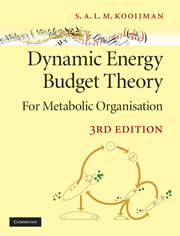Book contents
- Frontmatter
- Contents
- Preface
- 1 Basic concepts
- 2 Standard DEB model in time, length and energy
- 3 Energy, compounds and metabolism
- 4 Univariate DEB models
- 5 Multivariate DEB models
- 6 Effects of compounds on budgets
- 7 Extensions of DEB models
- 8 Covariation of parameter values
- 9 Living together
- 10 Evolution
- 11 Evaluation
- References
- Glossary
- Notation and symbols
- Taxonomic index
- Index
4 - Univariate DEB models
Published online by Cambridge University Press: 05 June 2012
- Frontmatter
- Contents
- Preface
- 1 Basic concepts
- 2 Standard DEB model in time, length and energy
- 3 Energy, compounds and metabolism
- 4 Univariate DEB models
- 5 Multivariate DEB models
- 6 Effects of compounds on budgets
- 7 Extensions of DEB models
- 8 Covariation of parameter values
- 9 Living together
- 10 Evolution
- 11 Evaluation
- References
- Glossary
- Notation and symbols
- Taxonomic index
- Index
Summary
This chapter discusses the fluxes of compounds in univariate deb models (one type of substrate, one reserve and one structure). Univariate deb models follow directly from the assumptions of Table 2.4 for the standard deb model, but the assumption of isomorphy is no longer used.
Figure 4.16 shows the example of Klebsiella which lives on glycerol. It must have many, rather than a single reserve. Multiple reserve systems, which are discussed in the next chapter, can behave as single reserve systems in the context of deb theory, if growth is limited by a single nutrient and all rejected reserve fluxes are excreted.
I start with a more detailed discussion of phenomena at varying food densities, followed by effects of changes in shape during growth. The rest of the chapter discusses mass and energy aspects that are implied by the assumptions of Table 2.4 and show, for instance, why the fluxes of essential compounds, as well as the dissipating heat, are weighted sums of the three basic powers assimilation, dissipation and growth. Therefore, dissipating heat can also be written as a weighted sum of three mineral fluxes: carbon dioxide, dioxygen and nitrogenous waste. This relationship is the basis of the method of indirect calorimetry. After half a century of wide application, this empirical method has finally been underpinned theoretically. Simple extensions of univariate deb models can deal with drinking by terrestrial organisms.
- Type
- Chapter
- Information
- Dynamic Energy Budget Theory for Metabolic Organisation , pp. 114 - 183Publisher: Cambridge University PressPrint publication year: 2009



